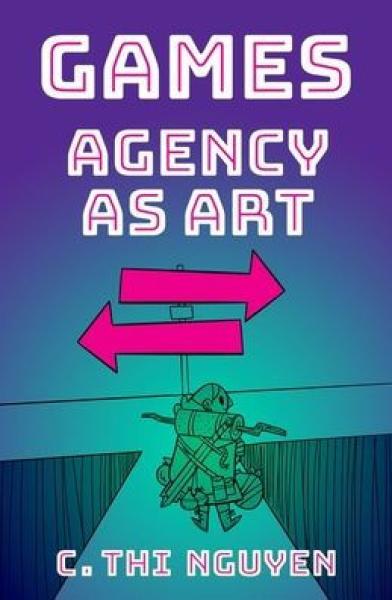Description
the fluidity of our own agency. We can throw ourselves, for a little while, into a different and temporary motivations.
This volume presents a new theory of games which insists on their unique value. C. Thi Nguyen argues that games are an integral part our systems of communication and our art. Games sculpt our practical activities, allowing us to experience the beauty of our own actions and reasoning. Bridging
aesthetics and practical reasoning, he gives an account of the special motivational structure involved in playing games. When we play games, we can pursue a goal, not for its own value, but for the value of the struggle. Thus, playing games involves a motivational inversion from normal life. We
adopt an interest in winning temporarily, so we can experience the beauty of the struggle. Games offer us a temporary experience of life under utterly clear values, in a world engineered to fit to our abilities and goals.
Games also let us to experience forms of agency we might never have developed on our own. Games, it turns out, are a special technique for communication. They are a technology that lets us record and transmit forms of agency. Our games form a "library of agency" and we can explore that library to
develop our autonomy. Games use temporary restrictions to force us into new postures of agency.
"Games are a unique art form. The game designer doesn't just create a world; they create who you will be in that world. They tell you what abilities to use and what goals to take on. In other words, they specify a form of agency. Games work in the medium of agency. And to play them, we take on alternate agencies and submerge ourselves in them. What can we learn about our own rationality and agency, from thinking about games? We learn that we have a considerable degree of fluidity with our agency. First, we have the capacity for a peculiar sort of motivational inversion. For some of us, winning is not the point. We take on an interest in winning temporarily, so that we can play the game. Thus, we are capable of taking on temporary and disposable ends. We can submerge ourselves in alternate agencies, letting them dominate our consciousness, and then dropping them the moment the game is over. Games are, then, a way of recording forms of agency, of encoding them in artifacts. Our games are a library of agencies. And exploring that library can help us develop our own agency and autonomy. But this technology can also be used for art. Games can sculpt our practical activity, for the sake of the beauty of our own actions. Games are part of a crucial, but overlooked category of art - the process arts. These are the arts which evoke an activity, and then ask you to appreciate your own activity. And games are a special place where we can foster beautiful experiences of our own activity. Because our struggles, in games, can be designed to fit our capacities. Games can present a harmonious world, where our abilities fit the task, and where we pursue obvious goals and act under clear values. Games are a kind of existential balm against the difficult and exhausting value clarity of the world. But this presents a special danger. Games can be a fantasy of value clarity. And when that fantasy leaks out into the world, we can be tempted to oversimplify our enduring values. Then, the pleasures of games can seduce us away from our autonomy, and reduce our agency."--
"Nguyen (philosophy, Univ. of Utah) analyzes games as aesthetic creations engaging the "art of agency," whose ultimate higher-order goals include the development of a "library of agencies"--the discovery (or creation) and practice of modes of achieving goals in general. Despite the obvious (and
acknowledged) debt to Bernard Suits's The Grasshopper (1978), this is no mere echo or defense of Suits's view of play, but rather a sophisticated and updated elaboration thereof, with many carefully chosen examples to support a variety of nuanced theses. ... This work significantly advances the
philosophy of games, and will be a rewarding read for anyone interested in the other fields mentioned above, regardless of their level of experience." -- S. E. Forschler, CHOICE
Product Details
- Oxford University Press, Brand
- Apr 23, 2020 Pub Date:
- 0190052082 ISBN-10:
- 9780190052089 ISBN-13:
- 256 Pages
- 9.3 in * 6 in * 1 in Dimensions:
- 1 lb Weight:




